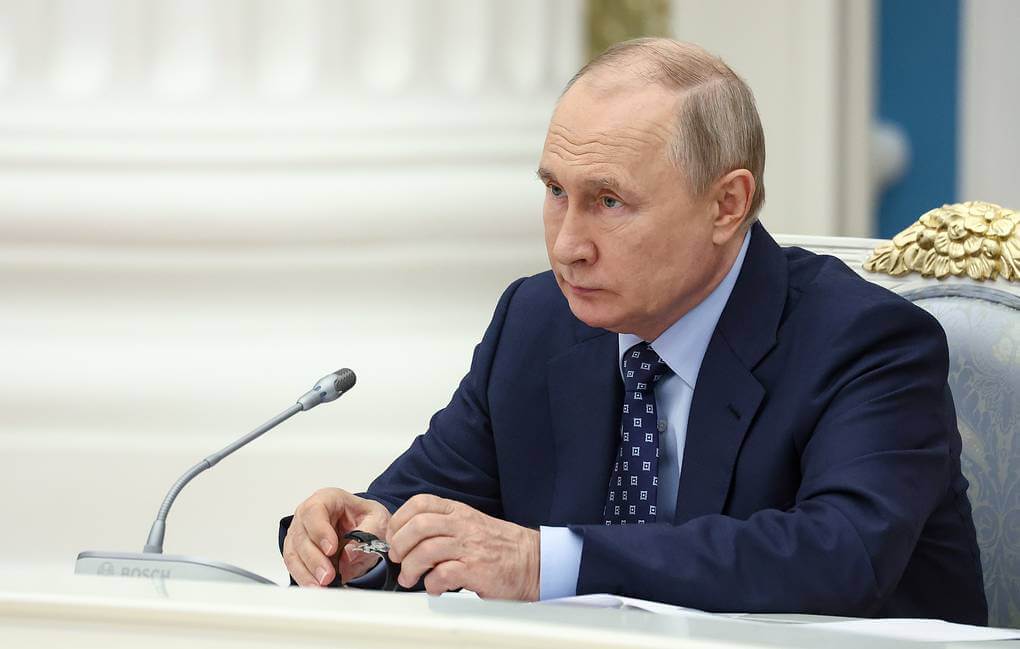Russian President Vladimir Putin stated at a business forum ahead of the BRICS summit in Johannesburg, South Africa, that the US dollar was losing its global value and that de-dollarisation is an “objective and irreversible” process.
Putin told the forum in a virtual address on Tuesday:
“We cooperate on the principles of equality, partnership support, and respect for each other’s interests, and this is the essence of our association’s future-oriented strategic course, a course that meets the aspirations of the world community’s main part, the so-called global majority.”
Putin participated in the 15th BRICS Summit by videolink on Tuesday. The gathering is taking place in the South African city of Johannesburg, addressing geopolitics, economic issues, trade and infrastructure development, business opportunities and the bloc’s potential expansion. pic.twitter.com/n9opnuI6cC
— RT (@RT_com) August 22, 2023
On De-dollarisation and Use of National Currencies
The Russian president emphasised that the BRICS nations aim to improve effective systems for mutual settlements and monetary and financial control. Putin said that the US dollar’s share in BRICS imports and exports is decreasing, claiming it was just 28.7% last year.
De-dollarisation is “gaining momentum,” Putin said, adding that members of the major developing countries are attempting to minimise their reliance on the greenback in mutual transactions.
Putin declared that the summit would discuss in detail about shifting trade between member countries away from the US currency and towards a “transition to national currencies in all areas of economic cooperation.”
The Russian president stated that the BRICS New Development Bank, which has already established itself as a “credible alternative to existing Western development institutions,” would play a significant role in these efforts.
📹 President Putin's video address to the Participants in the #BRICS Business Forum:
— MFA Russia 🇷🇺 (@mfa_russia) August 22, 2023
🤝 Our cooperation is based on the principles of equality, partner support, and respect for each other's interests.
🔗 https://t.co/CPgtqzs4LP pic.twitter.com/H3fNVrzHXT
On Trade Routes and Connectivity
The Russian leader claimed that improving connectivity and developing new sustainable traffic corridors have become shared goals in cooperation among the five nations. In this context, he said the BRICS Business Council’s proposal to build railway transport corridors and advanced multimodal logistics solutions is essential.
Putin stated that Russia intends to build two flagship projects in particular: a northern sea route with new ports, fuel terminals, and an expanded icebreaker fleet by “commissioning nuclear-powered vessels” and a north-south corridor connecting Russian ports with sea terminals in the Persian Gulf and the Indian Ocean.
He emphasised that these routes will provide greater possibilities for cargo transportation between Eurasian and African nations. Furthermore, he explained that this would promote the development of “new industrial, trade, and logistical facilities along the route.”
Reassuring African Nations of Free Grain
Putin stated that Russia would continue to be a reliable food provider to Africa, and that discussions on providing free grain to African nations were close to finalisation, as he pledged at the Russia-Africa summit in St Petersburg last month.
Additionally, he claimed that agricultural trade between Russia and African countries increased by 10% last year, totalling $6.7 billion; and it reached another record of 60% between January and June this year.
Putin stated that despite the sanctions, Russian grain shipments to Africa “were 11.5 million tonnes in 2022 and almost 10 million tonnes in the first six months of 2023.”
BRICS NEWS: None of the conditions of the grain deal were fulfilled, obligations to Russia were ignored - President Vladimir Putin. pic.twitter.com/YKBpSTjiXD
— DD Geopolitics (@DD_Geopolitics) August 22, 2023
Comments on Grain Deal
Putin asserted that Russia is deliberately prevented from supplying food and fertiliser abroad while also being hypocritically blamed for the current market crisis.
According to the Russian leader, implementing the grain deal, initially intended to guarantee global food security, lessen the fear of famine, and assist the world’s poorest nations, revealed these talking points.
“In a year under the deal, a total of 32.8 million tonnes of cargo has been exported from Ukraine, of which over 70 percent have reached high- and upper-middle-income countries, including the European Union. And only about three percent have gone to the least developed countries – that is, less than one million tonnes.”
Further, according to Putin, none of the conditions of the deal about lifting sanctions on Russian exports of grain and fertiliser to international markets have been fulfilled.
“Obligations to Russia in this regard have been simply ignored. Even our free transfer of mineral fertilisers blocked in European ports has been obstructed,” he remarked.
Accordingly, he emphasised that for such reasons, his country “refused to extend the so-called deal. And we will be ready to get back to it, but only if all obligations to the Russian side are actually fulfilled.”

